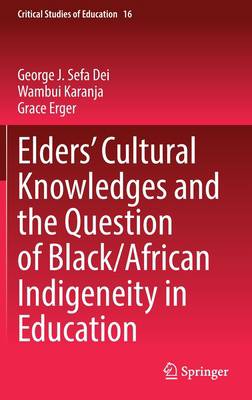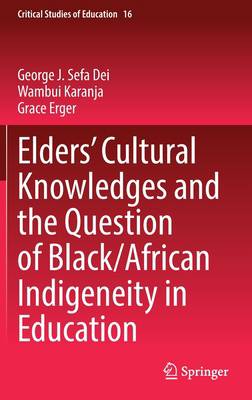
- Afhalen na 1 uur in een winkel met voorraad
- Gratis thuislevering in België vanaf € 30
- Ruim aanbod met 7 miljoen producten
- Afhalen na 1 uur in een winkel met voorraad
- Gratis thuislevering in België vanaf € 30
- Ruim aanbod met 7 miljoen producten
Zoeken
Elders' Cultural Knowledges and the Question of Black/ African Indigeneity in Education
George J Sefa Dei, Wambui Karanja, Grace Erger
€ 137,45
+ 274 punten
Uitvoering
Omschrijving
This book makes a strong case for the inclusion of Indigenous Elders' cultural knowledge in the delivery of inclusive education for learners who are members of minority communities. It is relevant to curriculum developers, teachers, policy makers and institutions that engage in the education of Black, Indigenous, Latinx and other minority students. This book provides opportunities for exploring the decolonization of educational approaches. It promotes the synthesis of multiple types of knowledge and ways of knowing by making a case for the incorporation of Indigenous knowledges and Indigenous Elders as teachers in learning spaces. The book is of interest to educators, students, and researchers of Indigenous knowledge and decolonizing education. Additionally, it is important for educational policy makers, especially those engaged in looking for strategic solutions to bridging educational disparities and gaps for Indigenous, Black, Latinx and other minority learners.
Specificaties
Betrokkenen
- Auteur(s):
- Uitgeverij:
Inhoud
- Aantal bladzijden:
- 226
- Taal:
- Engels
- Reeks:
- Reeksnummer:
- nr. 16
Eigenschappen
- Productcode (EAN):
- 9783030842000
- Verschijningsdatum:
- 4/01/2022
- Uitvoering:
- Hardcover
- Formaat:
- Genaaid
- Afmetingen:
- 156 mm x 234 mm
- Gewicht:
- 512 g

Alleen bij Standaard Boekhandel
+ 274 punten op je klantenkaart van Standaard Boekhandel
Beoordelingen
We publiceren alleen reviews die voldoen aan de voorwaarden voor reviews. Bekijk onze voorwaarden voor reviews.











